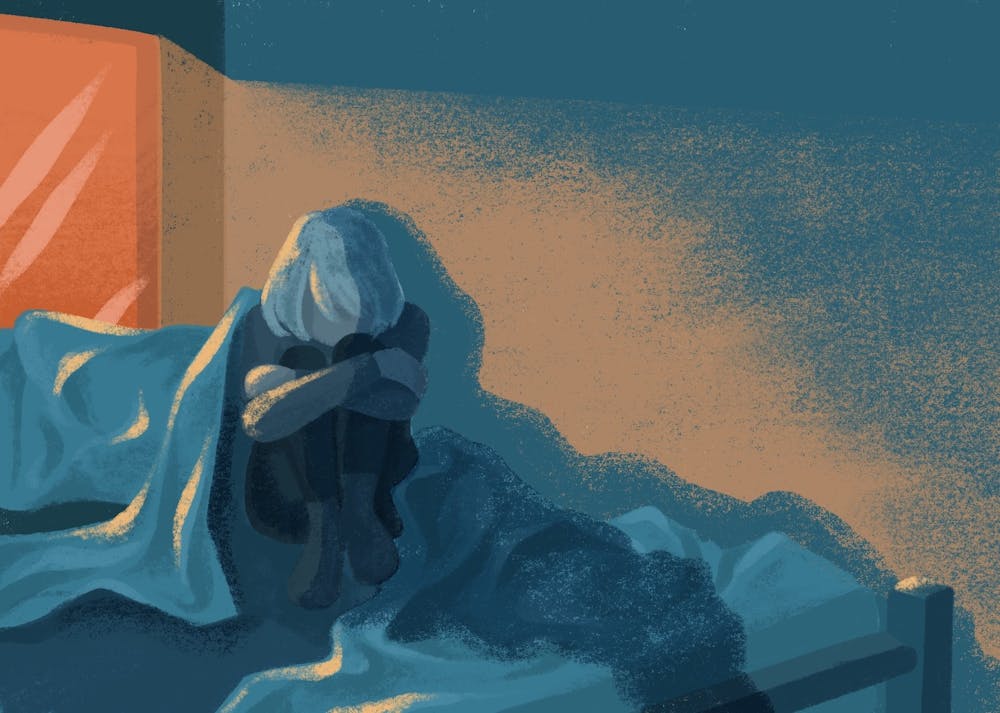For junior Taylor Tufano, who is studying business marketing, the transition from living in her sorority house in the Greek Leadership Village to an isolation room in a completely different building wasn't exactly easy.
On Oct. 9, Tufano learned she was exposed to COVID-19 and had to quarantine for the next 14 days. Because she lived in the GLV, where students use communal bathrooms, Tufano was told she had to move out to quarantine.
During her quarantine, Tufano tested positive for COVID-19, extending her period away from her sorority from a 14-day quarantine to a 17-day isolation from the time she was exposed. Those stretches of time quarantining or isolating are a long time for some students to be alone.
“Being alone in here, there’s definitely some anxiety and depression that comes up," Tufano said. "I miss seeing my friends and waking up to 40 different sisters every morning."
Tufano's feelings of loneliness, anxiety and depression are ones shared by students who enter quarantine or isolation for multiple days.
Following notification of exposure, typically delivered via the ASU Health Services patient portal, some students may be asked to move out of their dorms into an isolation dorm, either in their building or in another one on campus. They must remain there alone for the duration of their quarantine or isolation.
READ MORE: Inside ASU's COVID-19 exposure management system
Students who have tested positive must spend 10 days in isolation, which is four days shorter than those who have merely been exposed and have to quarantine.
“It's just been a little lonely. But I guess that's what FaceTime and all of those different apps are there for,” Tufano said. "I would say just kind of learning how to really be conscious of your feelings and emotional thoughts (is important), because it can get really lonely."
Like Tufano, some students who live in residential halls with communal bathrooms like Best Hall, Hayden Hall or the GLV said they were told by the University that they needed to move out of their buildings to complete their isolation or quarantine period.
Kaylah Noble, a freshman music education major who lives in Best Hall, experienced this firsthand.
When Noble starting experiencing mild symptoms of COVID-19, she had never been notified that she was exposed to the virus. She said she got tested and moved into an isolation dorm in McClintock Hall while waiting for her test results.
Noble said she had to make this move twice during the fall semester already, as there have been two times when she was experiencing symptoms of COVID-19 and needed to be tested. Noble tested negative both times, so the longest she had to stay in isolation was around 65 hours.
However, the process of being moved in and out of her dorm while awaiting her test results was emotionally exhausting, she said.
“I am very much a people person, so being stuck in that room for 23 hours a day was not fun," Noble said. "The rooms were dark, the blinds weren’t very good so I felt that someone could walk by and just look right in, so that was really weird and unsettling."
Since Noble had no known exposure and had not yet received a positive test, she was allowed to go outside once a day to take a walk, provided she did not come in close contact with anyone and was wearing a mask at all times.
“It made me feel really alone,” Noble said. “I couldn’t imagine doing the full 14 days in there.”
Ariel Rey, a junior studying business management, was also placed in quarantine due to possible exposure to the virus but tested positive one day after being notified of this exposure, meaning her 14-day quarantine was reduced to a 10-day isolation period.
“Being completely isolated is a very interesting dynamic,” Rey said. “You really have nothing to do and it's just you.”
Rey said at one point, ASU talked to her about the possibility of moving another positive student into her isolation room so that she would have a roommate, but this plan never came to fruition.
“I never ended up getting a roommate. I'm glad I didn't because I don't think people who are positive should be together in any capacity,” Rey said.
Many students understand the fact that quarantining is vital to limit the spread of COVID-19 at ASU. However, the prolonged period of being alone in a dorm room to quarantine or isolate can be challenging, especially for students' mental health.
READ MORE: Gallery: Views from quarantine
“The other half, I was really longing to see somebody in person," Rey said. "Like I remember opening the door when I got my release letter. I sprinted out and I was so happy because I was like, 'Oh my God. I have not been outside in the sun in 10 days.'”
Students in need of support may access ASU Counseling Services remotely seven days a week.
Reach the reporter at mcbushma@asu.edu and follow @meredithbushman on Twitter.
Like The State Press on Facebook and follow @statepress on Twitter.




